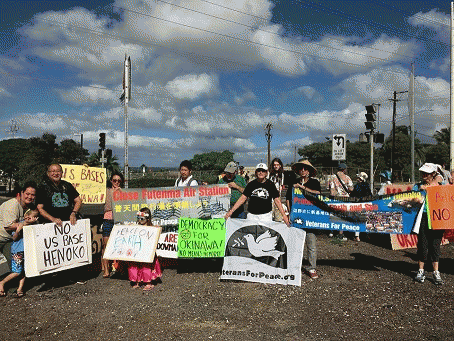On December 27, 2016, a small group of Veterans for Peace, Hawaii Peace and Justice and Hawaii Okinawa Alliance were at Pearl Harbor, Hawaii with our signs to remind Prime Minister of Japan Shinzo Abe and U.S. President Barack Obama that the best gesture of condolences for casualties caused by the Japanese attack on Pearl Harbor would be Japan preserving Article 9 "No War" of its constitution.
Mr. Abe, as the first sitting Prime Minister of Japan, came to the Arizona Memorial to express condolences for the deaths of 2,403, including 1,117 on the USS Arizona during the December 7, 1941 Japanese Imperial Military forces attack on the Naval Base at Pearl Harbor and other US military installations on the island of Oahu, Hawaii.
Mr. Abe's visit followed the May 26, 2016 visit of President Obama to Hiroshima, Japan, the first sitting U.S. President to go to Hiroshima where President Harry Truman ordered the United States military to drop the first atomic weapon on humans causing the deaths of 150,000 and 75,000 in Nagasaki with the dropping of the second atomic weapon. When President Obama visited the Hiroshima Peace Memorial Park, he did not apologize for the United States dropping the atomic bombs but instead came to honor the dead and call for a "world without nuclear weapons."
During his visit to Pearl Harbor, Prime Minister Abe did not apologize for the Japanese attack on the United States, nor for the carnage the Japanese wrecked in China, Korea, Southeast Asia and the Pacific. However, he did offer what he called "sincere and everlasting condolences to the souls" of those who were lost on December 7, 1941. He said the Japanese had taken a "solemn vow" to never again wage war. "We must never repeat the horrors of war again."
Prime Minister Abe emphasized reconciliation with the United States: "It is my wish that our Japanese children, and President Obama, your American children, and indeed their children and grandchildren, and people all around the world, will continue to remember Pearl Harbor as the symbol of reconciliation, We will spare no efforts to continue our endeavors to make that wish a reality. Together with President Obama, I hereby make my steadfast pledge."
While these statements of acknowledgement, of condolence or sometimes, but not too often, apology from the politicians and heads of government are important, the apologies of citizens for what their politicians and heads of government have done are in their name, in my opinion, the most important.
I have been on several speaking tours in Japan, from the northern island of Hokkaido to the southern island of Okinawa. At each of the speaking events, I, as a U.S. citizen and as a U.S. military veteran, made an apology to the citizens of Japan for the two atomic bombs my country dropped on their country. And at each venue, Japanese citizens came up to me to thank me for my apology and to give me their apology for what their government had done in World War II. Apologies are the least we can do when we as citizens can not prevent politicians and the government bureaucracy from taking actions that we disagree with and that result in unbelievable carnage.
How many apologies must we, as American citizens, make for the chaos and destruction our politicians and government have caused just in the past 16 years? For the tens, if not hundreds of thousands, of deaths of innocent civilians in Afghanistan, Iraq, Libya, Yemen and Syria.
(Note: You can view every article as one long page if you sign up as an Advocate Member, or higher).






